- Author Jason Gerald gerald@how-what-advice.com.
- Public 2024-01-19 22:11.
- Last modified 2025-01-23 12:04.
If you find, adopt, or give away a kitten, you need to know its age. Kittens develop much faster than humans, and the needs of a two week old kitten are different from those of a 6 week old kitten. While you can't know for sure his age, a well-founded estimate will help you take proper care of your new friend.
Step
Method 1 of 4: Checking for Physical Signs
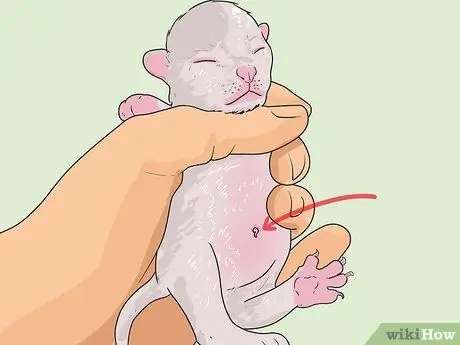
Step 1. Look for the cut marks on the umbilical cord
If you can find one, you can be sure that a new kitten has been born.
- The mother cat will usually bite the baby's umbilical cord until it breaks. What remains is a bit of tissue hanging from the kitten's belly.
- The cut of the umbilical cord will usually go away on its own in the first 3 days of the kitten. If your kitten still has a cut in the umbilical cord, it's probably only a few days old.
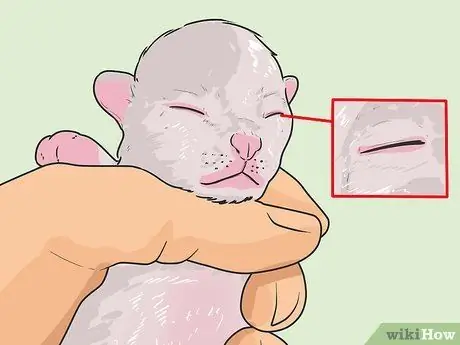
Step 2. Examine the kitten's eyes
A kitten's eyes will develop through several stages, starting to open and eventually changing color. Noticing and observing changes in his eyes can help you estimate the kitten's age.
- Kittens do not open their eyes until they are 14 days old, although some kittens can open them when they are only 7 to 10 days old. If the kitten's eyes are still closed, it's likely that she was just born. If the kitten has opened his eyes, he is at least 1 week old.
- If your kitten's eyes are just starting to open but are still squinting, it's probably between two and 3 weeks old. When a kitten begins to open its eyes, it will appear bright blue in color, regardless of the changes in its eye color as it grows older.
- If you have an older kitten and notice that her eye color is starting to change, her age is likely to be between 6-7 weeks. At this time, the kitten's irises begin to change to their permanent adult color. Note that if your kitten grows up to be an adult with blue eyes, you may not be able to use the kitten's eye color change to help determine its age.
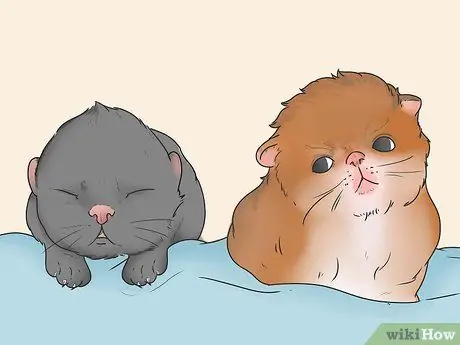
Step 3. Check the kitten's ears
Like eyes, cat ears also go through changes during their early development. You may be able to estimate the age of a small kitten based on its features or changes in its ears.
- If the kitten's ears are firmly attached to its head, it is likely less than 1 week old. Kittens are born with their ear canals closed so that their ears appear to be stuck to their heads. A kitten's ears will begin to open between 5 and 8 days of age.
- Watch as the kitten's ears straighten up. Kittens' ears take longer to open than their eyes. Although the closed ear canal will begin to open between the ages of 5 and 8 days, it will take much longer for the ears to appear erect. A kitten's ears will straighten between two and three weeks of age.
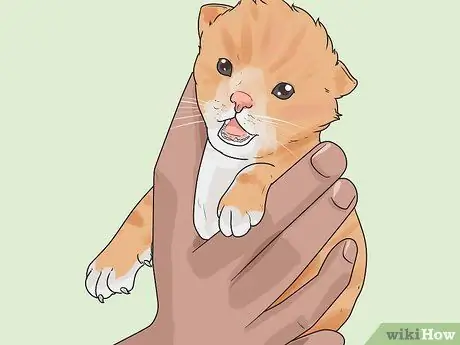
Step 4. Check the kitten's milk teeth
A good way to estimate the age of a small kitten or juvenile is to check for teeth and observe the development of the teeth. Kittens without teeth are most likely newborns, less than 2 weeks old. If the kitten already has teeth, you can estimate its age based on the number and characteristics of the teeth.
- The first baby teeth usually emerge from the gums at about 2 or 3 weeks of age. The first teeth to erupt are most likely the incisors. If you can't see the tooth directly, you may be able to feel the gum with your finger.
- Milk canine teeth will begin to grow at the age of 3-4 weeks. These canines are long, pointed teeth, and grow next to the incisors,
- Milk front molars (premolars) begin to grow from the gums at about 4-6 weeks of age. The front molars are the teeth that grow between the canines and the molars.
-
If all of the baby's baby teeth have erupted, but she doesn't have any molars yet, she should be around four months old. Kittens should have:
- 6 incisors in the upper jaw and 6 incisors in the lower jaw
- 2 canines in the upper jaw and 2 canines in the lower jaw (on both sides of the last incisor)
- 3 front molars in the maxilla
- 2 front molars in the lower jaw.

Step 5. Check for adult teeth
If you notice larger adult teeth in your kitten, they are probably 4 months old or more. Teething at this time may not be as accurate as when kittens were young, but you should be able to guess at a kitten's age based on when their adult teeth began to appear.
- Adult incisors begin to grow at about 4 months of age.
- Between 4 and 6 months, the canines, front molars, and milk molars will be replaced by adult teeth.
- If the kitten has fully grown adult teeth and 4 molars, it is likely that she is at least 7 months old.
- Note that this guide is based on healthy kittens with normal conditions; Kittens who have had an illness or have had an accident may lose their teeth or have delayed teething.
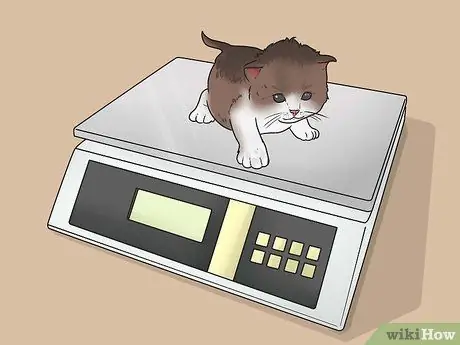
Step 6. Weigh the kitten
Estimates of age based on weight are not accurate estimates because there are differences in body size and cat breeds, but body weight can be one of the supporting information to determine the approximate age of a kitten.
- The average healthy kitten weighs about 100g at birth, and is gaining 14g each day. So, a normal kitten will weigh between 100 grams and 150 grams in the first week of life. (For the record, kittens weighing less than 100 g may be sick or malnourished. Take the kitten to the vet for examination).
- A normal kitten weighs between 113 - 170 grams and is smaller than the palm size of an adult human at 1 to 2 weeks of age.
- Most kittens weigh between 170 - 225 g by 2 - 3 weeks old.
- Kittens weighing 225 g to 450 g are most likely between 4 - 5 weeks old.
- Kittens weighing between 680 g - 900 g are likely to be 7 - 8 weeks old.
- Cats aged three months or more on average gain 0.45 kg per month until their weight stabilizes at about 10 months of age. So, a cat weighing around 1.5 kg is likely 3 months old, and a cat weighing about 2 kg is likely 4 months old. While these are general guidelines, they are usually quite useful in cats older than 12 weeks into adulthood, weighing around 5 kg in most cats.
Method 2 of 4: Checking the Kitten's Behavior
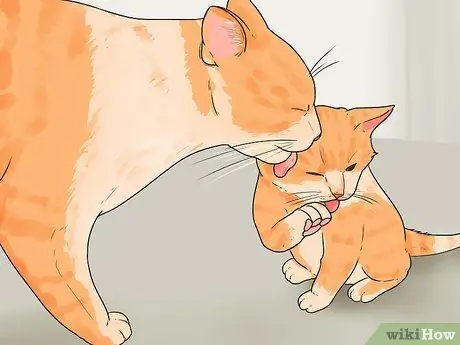
Step 1. Watch for signs your kitten is ready to eat solid food
This step only applies to kittens living with their mother. The mother cat will stop feeding the kittens 4 - 6 weeks after birth. This is when the mother cat's milk begins to dry.
- If the mother cat has stopped breastfeeding her kittens altogether, the kittens are probably around 7 weeks old. After 7 weeks, the mother cat will not nurse the kitten again. You may notice that the kitten tries to get close to its mother for a feed, but the mother cat will shoo it away and refuse.
- Kittens aged 7 - 8 weeks will begin to leave their mother more often and take longer to explore and adventure.
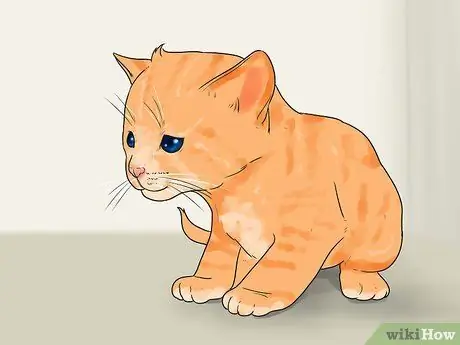
Step 2. Watch the kitten's movements
A kitten's ability to walk can indicate its age based on normal development. Kittens are unable to stand or walk until they reach about 2 to 4 weeks of age. Until then, kittens spend most of their time close to their mother and siblings, sleeping, or suckling. If a kitten moves in its first few weeks, it will crawl on its stomach.
- An unbalanced, limping gait indicates that the kitten is about 2 weeks old.
- If your kitten starts to seem confident in her ability to walk, she is probably more than 3 weeks old.
- Between 3-4 weeks, kittens will begin to show the straightening reflex, which is the ability to change positions in the air to land on their feet.
- Around 4 weeks of age, kittens will begin to walk more steadily and explore their environment. His curiosity and joy will naturally arise as his ability to move increases. Kittens at this age will begin to exhibit pouncing behavior.
- Kittens that have been able to run are at least 5 weeks old.
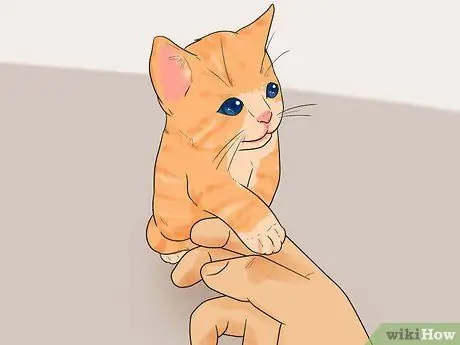
Step 3. Observe the cat's reaction to sounds and moving objects
Although the canals in the eyes and ears begin to open in the second or third week of life, the senses are still developing. Responses to external stimuli signal a kitten's age of about 3.5 weeks.
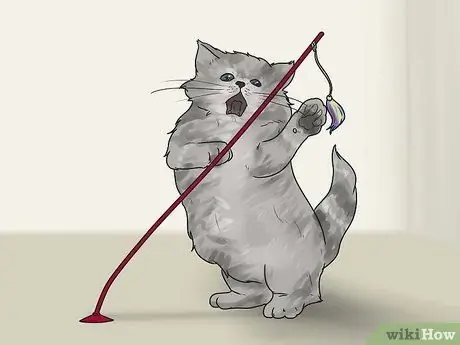
Step 4. Observe her confidence and cheerfulness
A healthy kitten will become more confident between five and six weeks of age. This is largely due to the development of movement and coordination abilities. Kittens of this age will begin to explore their environment more daringly than smaller kittens and are still indecisive.
By 7-8 weeks of age, kittens should be able to move and coordinate well. He'll enjoy running, playing, and hanging out with humans or other pets, as well as exploring higher ground by practicing his jumping moves
Method 3 of 4: Identifying Sexual Maturity
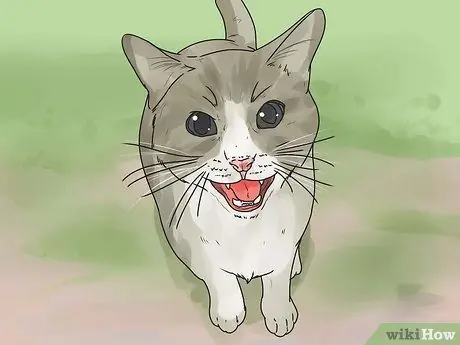
Step 1. Watch for signs of puberty
At about 4 months of age, a kitten's behavior will begin to change as a result of its hormonal changes. Kittens this age will meow loudly at night or try to run away and get out of the house. This could be a sign that the kitten is starting to enter puberty.
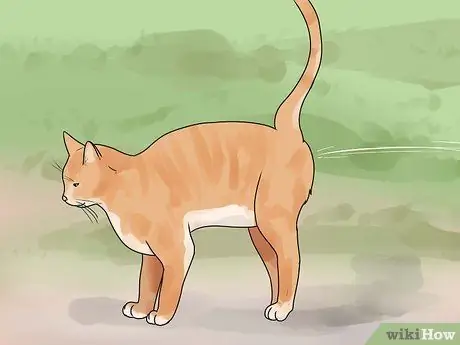
Step 2. Watch for further signs of sexual maturity
At the age of 4 - 6 months, kittens have basically entered into adolescence. Cats at this age begin to lose baby fat on their bodies, so their bodies become thinner, even though they gain weight.
- Male kittens older than 4 months may start marking their territory (by spraying urine) to attract female cats to mate.
- A female kitten may begin to be in heat between 4 and 6 months of age. It also includes marking the territory with its smell, as well as loud howls and groans.
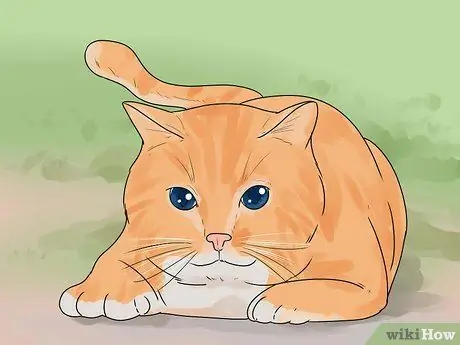
Step 3. Recognize the "teenage" period in cats
Kittens 7 months or older are considered juvenile cats, larger in size, and sexually mature. Be aware that a teenage female cat can get pregnant if not spayed. As they mature sexually, cats will become more aggressive.
- Kittens begin to challenge the dominance of other cats at about 6 months of age. Teenage kittens tend to bite more often than smaller kittens or adult cats.
- Cat bites are more common in juvenile cats, so be careful when caring for cats of this age group.
Method 4 of 4: Confirming the Estimated Age of the Kitten

Step 1. Ask your agency or source for adopting a kitten
Good cat breeding institutions keep complete records of their kittens, and can provide fairly accurate estimates. If they didn't see the birth of a kitten in person, they could at least give an estimate. Even if a shelter accepts kittens after birth, they have experienced staff and veterinarians who can provide a professional estimate.
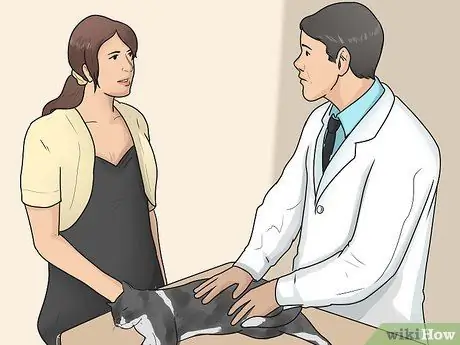
Step 2. Ask your veterinarian
When you take your kitten to the vet for the first time, ask the vet to estimate the kitten's age according to their expertise. At the same visit, the vet will also advise you to check and vaccinate the kitten so that it grows up healthy.






